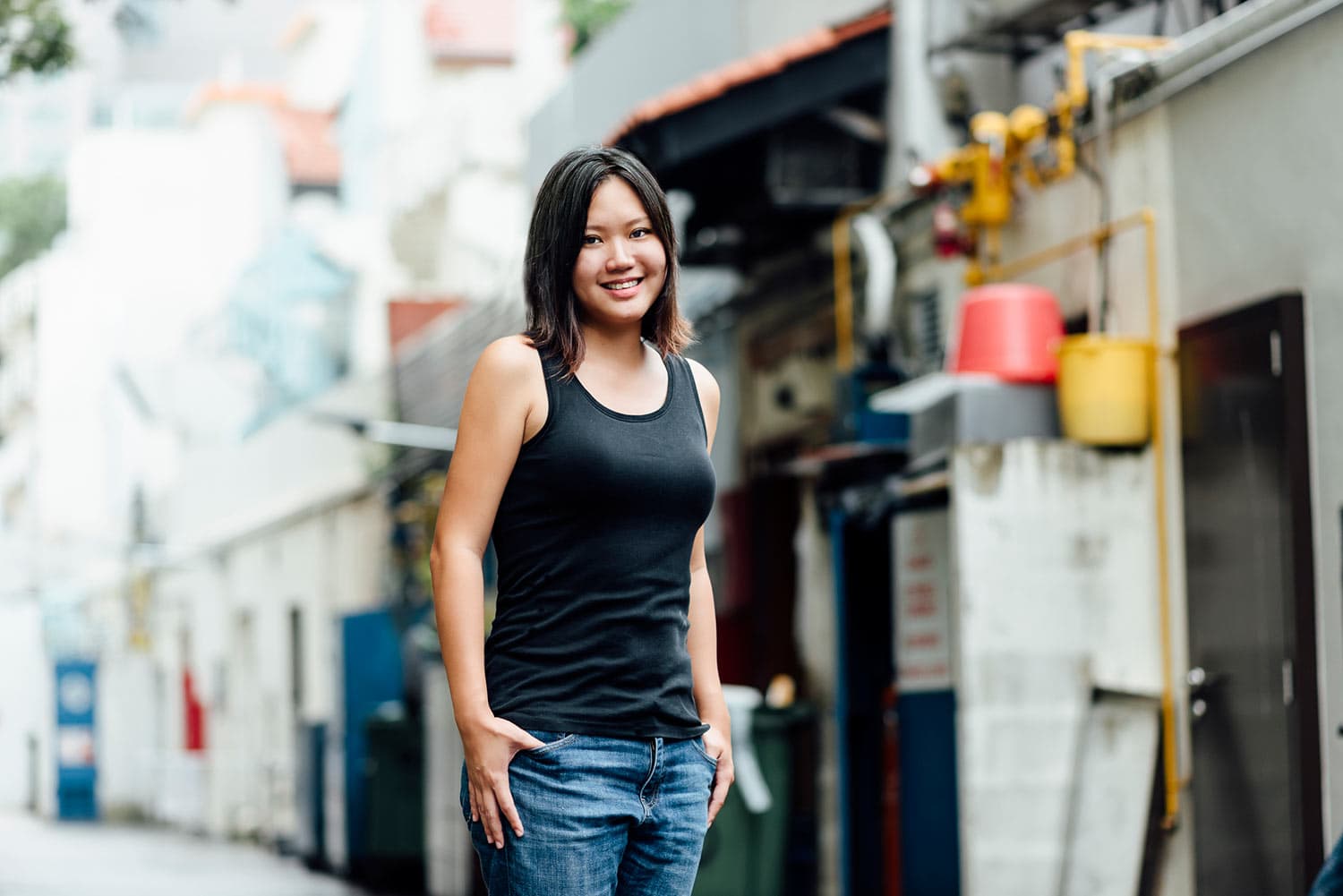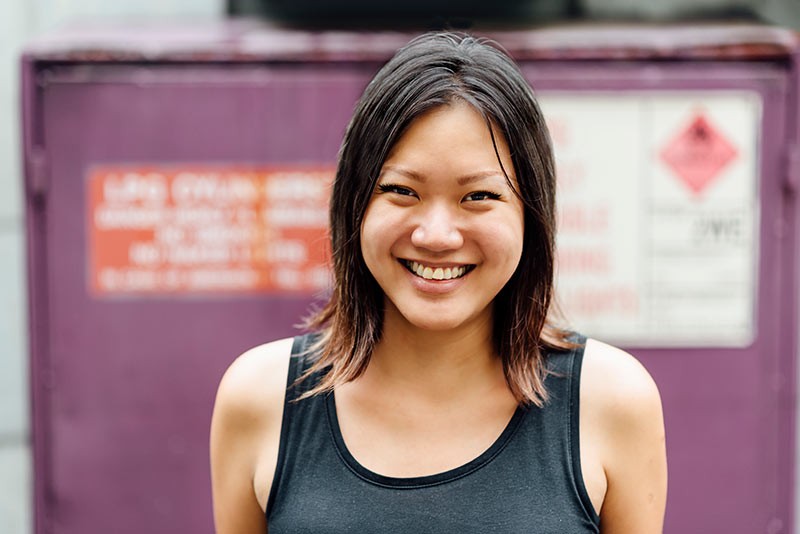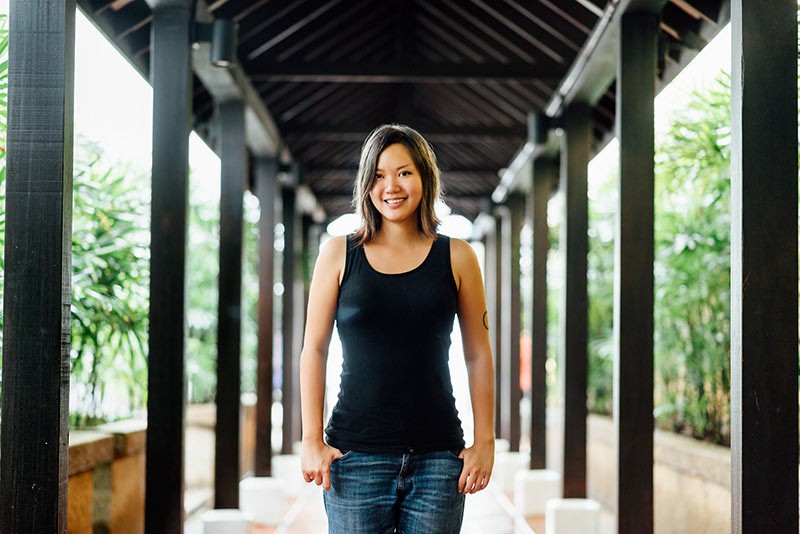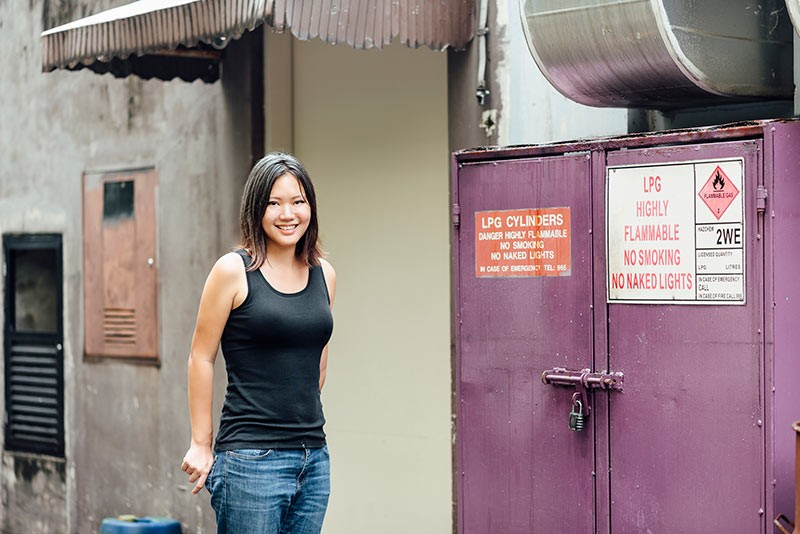Adrianna Tan: I'm Just a Busybody

Seeing my awkward wave, Adrianna Tan navigates the bustle and joins me in my corner. Now out of the shadows, her silvery-grey hair and tattoo of a winged circle and constellation of Capricorn come into view. The tattoo happens to be the same one as Lieutenant Starbuck, her favourite character from Battlestar Galactica, also her favourite show. “Flying spaceships and saving the world? Sure!” the sci-fi geek declares, in response to whether she would like to be the galaxy-trotting female character. As a long-time champion for gender equality, LGBT rights, the under-privileged, and the general empowerment of human beings, she’s not very far off. In these dim surroundings of Dapper Coffee, situated along Amoy Street, I easily imagine myself meeting a bounty hunter in one of the underbelly establishments of Coruscant. It’s difficult to pigeon-hole Adrianna, which suits her. She definitely does not want to be called a changemaker; not even a social entrepreneur. “Oh, I’m just a busybody,” she suggests. “People are very quick to put you in a box because of your beliefs, and I don’t think humanity works that way.” 150 girls in rural India are thankful for her being a 'busybody'. Over the past three years, through her non-profit, Gyanada Foundation, she has been keeping girls in school by providing them with scholarships. One day, a young girl told her that her father had stopped hitting her mother when she started making a dollar a day. “I was struck by how helping underprivileged women to start their micro-business can bring about real social impact on the domestic level,” she tells me. Thus the concept for Wobe, a portmanteau for “women benefit” was birthed. Wobe aims to empower the underserved class in Indonesia by allowing them to sell digital goods such as pre-paid phone credits, internet packages, and utility vouchers. Lifting and serving the underserved opens up whole new possibilities for financial services, she says. “Nearly 80 per cent of Indonesians don’t even have a bank account,” she explains. “But even as people are becoming more affluent, their institutions are still stuck in their old ways.” Wobe hopes to eventually provide a full suite of financial services to help the people at the bottom of the pyramid. Despite her Robin Hood-like missions, she says she’s very much a capitalist, but believes it should be a source of empowerment, not material gain. “When I look at someone who spends 15,000 dollars on a handbag, I go – why? What do you do with that thing?”
YONG HUI YOW: What are the problems with the way phone credits are being distributed and sold in Indonesia now?
ADRIANNA TAN: There are about 12 layers of middlemen between the Telco and end-customer. There are distributors, aggregators, large companies, smaller companies, and individuals who have amassed a lot of influence controlling certain geographies and areas in the country. Being such a large country, a lot of distribution is required. In the past, scratch cards were sold; now, it’s become electronic. What we are trying to do is not to replace the middlemen; we are simply trying to move further up the food chain so our agents are able to get a better deal. Right now, they receive very low margins because they are so far down the food chain.
YONG HUI: How many transactions does Wobe facilitate currently?
ADRIANNA: We've only done a small trial, not a full commercial launch, so I cannot share the numbers with you, but we are targeting to have about 40,000 transactions a day.
YONG HUI: What have been the challenges in acquiring users?
ADRIANNA: It's about building up trust. Some places are more receptive than others. For example, certain Javanese people are more entrepreneurial than people in other areas. So, it can be a little difficult to understand what the differences are in each area before approaching them. It will take time to build up trust.
YONG HUI: Why didn’t you start Wobe in India instead, since you’re already operating Gyanada in the country?
ADRIANNA: We think South East Asia as a whole is a bigger commercial opportunity for start-ups like us. Yes, I would probably be able to operate quite well in India, but in terms of growth, Indonesia provides a bigger opportunity. In Indonesia, many services are tailored to the upper-classes. Financial services and institutions don’t cater to the poor. It’s a very unequal society. Nearly 80 per cent of Indonesians don’t even have a bank account. However, even though people are becoming more affluent, their institutions are still stuck in their old ways. Wobe wants to tap into this opportunity to introduce a platform which is more beneficial for the people at the bottom of the pyramid.
YONG HUI: What does Gyanada mean?
ADRIANNA: Gyanada is another name for Saraswati, the Hindu goddess for knowledge, learning and education. We really wanted an Indian name. What Gyanada does is provide scholarships for young girls, with funds we raise from corporates. Right now, we are in five cities across India, and our next step is to expand some of the programmes we have. We’ve been doing this for the past three years now.
YONG HUI: Why did you start Gyanada?
ADRIANNA: In India, even though there is universal enrolment for primary school kids, at about the age of 12, many girls drop out of school, unfortunately. Gyanada steps in and gives them a full scholarship so their parents don’t have to worry about the financial aspects. Our goal is to remove the disincentive a lot of families might have with regard to keeping their daughters in school. Obviously, there are other issues at play which cannot be fully solved, but this is the first step, and we are working very hard at it.
YONG HUI: How many girls have Gyanada given scholarships to?
ADRIANNA: We have supported a total of a hundred and fifty girls. We keep it at this number because we support the same girls year after year until they finish Grade 10. The girls we are funding are of different age groups. The first graduating batch is in one or two years’ time.
People are very quick to put you in a box because of your beliefs, but I don’t think humanity works that way.
YONG HUI: Empowering people seems to be a big part of what you do. Where does that stem from?
ADRIANNA: I wish I knew. To me, it has always been quite natural. When I look at someone who spends 15,000 dollars on a handbag, I go – why? What do you do with that thing? So maybe, that is natural to them as empowering people is to me. It's a matter of what your values are, and what's important to you. I was brought up in an environment of giving and generosity, so maybe that’s why it’s always been natural to me.
YONG HUI: Is that why you were hesitant to be profiled on High Net Worth?
ADRIANNA: Yes. [laughs] I'm a bit of a hippie. But don’t get me wrong, I'm very much a capitalist; I just don’t enjoy the celebration of high finance and money. Even if I were to become a multi-billionaire, I will never buy a 15,000 dollar bag; I'd rather invest the money in people who want to start businesses. I don’t see capitalism as a source of material wealth, but more as a tool for empowerment.
YONG HUI: What have you learned about being vocal online throughout the years?
ADRIANNA: The Singaporean standard for fame and celebrity is very low. Well, for a time, I found it impossible to date because people started assuming things about me based on what I wrote, regardless of whether it's positive or negative. Apparently, this comes with being vocal. But it's also a gauge for who can take it and who cannot. So as long as you are known for something, people will form preconceived ideas about what you stand for and believe, which can get very restrictive. On the other hand, it is helpful to have a strong personal brand because it's easier to identify with the right people, and make connections. You don’t have to explain a lot about who you are and what you do. Then again, it comes down to what you put out there.
I don’t see capitalism as a source of material wealth, but more as a tool for empowerment.
YONG HUI: What are some of these views which have caused you to feel restricted?
ADRIANNA: I've always been vocal about my support for some of the opposition, but in recent years, that view has shifted a little bit after my own personal involvement in opposition politics. Having an inside view taught me that things are not as simple reading The Online Citizen, and then jumping to quick conclusions. Many don’t bother to seek out or understand the issues properly. Now that I have the inside view, and have altered my views, when I say things which are not socially leftist enough, some people get upset. For example, many think that if you disagree with a certain government policy, then you must therefore also be pro-opposition, and hold all the other views which come with it, including being ‘anti-foreigners’ and xenophobic. There's the expectation that if you believe in one thing, then you are also assumed to believe in all the other things which come with it – which I frankly find a little stupid. If you have your own mind, or change your mind about something, some group of people will always perceive you to have betrayed them – you cannot please everyone. But it's a sign of growth when you change your mind about something. Views I held when I was 15 differ from my views I hold now. Even two months is sufficient to change your beliefs, under the right circumstances. Unfortunately, people are very quick to put you in a box because of your beliefs, but I don’t think humanity works that way. One can surely hold different contrary positions and not be pigeonholed. And not just your beliefs – I don’t understand why people love to ask: what school did you go to – even into adulthood. Why does it matter? As an adult, your identity should have already evolved beyond schools.
YONG HUI: Do you identify with the terms changemaker or social entrepreneur?
ADRIANNA: I don’t really like those terms. I find them to be buzzwords, and I don’t even really know what they mean. I don’t think the people who use them have very good definitions either. At the same time, I don’t know if there’s a better word.
YONG HUI: What about social activist?
ADRIANNA: No, I don’t like that either.
YONG HUI: What term would you be comfortable with?
ADRIANNA: Oh, I’m just a busybody. That's probably what I identify with – a busybody.
YONG HUI: You're working in a number of conservative countries such as India and Indonesia. Has that ever been an issue?
ADRIANNA: Even though I don’t hide that I'm queer, I'm not super open about it. But people can Google me, find stuff about me, and potentially use that against me. That's part and parcel of having an online identity. If I had a normal job, maybe that would be a different story, but I don’t know what that's like because I've never really had a traditional job. If I did, HR would probably be Googling me, and trying to look for things I’ve written and talks I’ve given, my tweets and so on. Depending on what my feelings were at a point in time, my tweet might reflect something positive or negative. Since I work for myself, I don’t really have to care about these things.
I’m a lot like my dog, Cookie, who has not been exposed to bad things and the evils of life.
YONG HUI: Have you ever received threats for speaking out or for being you?
ADRIANNA: Yes, when I was younger, maybe 17 or 18, there were some unpleasantness, and rude people who did not agree with my views, but not recently. Quite a lot of women face some kind of online harassment. Once, I remember posting a picture of a cake, and having someone say: don't shit here. That said, I still believe that putting everything out there, and defining your key message is better than putting nothing out there, and letting people guess. However, it’s a double-edged sword. My friends always say that in business and love, I’m a lot like my dog, Cookie, who has not been exposed to bad things and the evils of life. So I believe people are great, and I love and trust them a lot. Regarding those closer to me – my family is very religious, but ultimately, they love me a lot. They understand this is a part of me which they cannot change. With friends, I've always tried to be around people who are somewhat progressive.
YONG HUI: You’re known for your travels as well. What does travelling do for you?
ADRIANNA: I sometimes don’t even think of it as travelling anymore. There are a handful of countries such as India, Thailand, and Indonesia – when I’m in these places, I forget I'm a tourist, because I’ve immersed myself so much in their local experiences and cultures. For me, it's about seeing new things, and being exposed to new situations such as a warzone. I was travelling around Yemen in a burka, and stuff was just blowing up all the time. I was supposed to travel to this other city on a bus but at the last minute, I decided to change my itinerary and take another bus to another city. When I got there, I learned that the people who boarded the bus to my original destination were dead from a bomb blast.
I would like to see better maternity benefits for women who are blue-collared professionals.
YONG HUI: Is there gender equality in Singapore?
ADRIANNA: Of course not. There isn’t equality between men and women anywhere in the world, which is why there is still a need for the feminist movement. For example, men and women are not paid the same for the same job and responsibility, so of course it’s not fair and equal. I would like to see better maternity benefits for women who are blue-collared professionals. Many women who are white-collar professionals also feel that bearing a child adds pressure on their careers, and they don’t have a lot of protection for that. In most cases, they probably cannot take their child to work. In Singapore, it's difficult to be a woman and less well-off, and especially so if you are a single mother.
YONG HUI: What does being a feminist mean?
ADRIANNA: I think it's a concept which is very misunderstood, but the basis is that women and men should have equal rights. If you believe so, then how you express it can take any form in your daily life.
YONG HUI: What are Wobe’s plans next year?
ADRIANNA: We will be working really hard over the next couple of years to expand the products and features, and make Wobe a successful commercial product. Our bigger vision is to build a set of financial services delivered through mobile for people in South East Asia who don’t have a bank account and are underserved by their financial institutions.
I want to be known for being able to make things happen, for the people who need the most help.
YONG HUI: What do you want to be remembered for other than a busybody?
ADRIANNA: I want to be known for being able to make things happen, for the people who need the most help. Whether it’s through Wobe or Gyanada, it’s to do with providing resources and assistance for the underprivileged to do better in life. One of the things I really want to do is to invest in queer entrepreneurs in Singapore, especially if they come from backward economic environments, and at risk of being disowned by their families.
YONG HUI: What's up with Battlestar Galactica?
ADRIANNA: I'm a really big fan! And I identify with one of the lead characters, Lieutenant Starbuck. She saves the world everyday and does not sleep. She has some flaws despite all the good things she’s doing, and she might even be a robot. We don’t know for sure until later on. She's one of the strongest female characters on TV. Battlestar Galactica is a cult favourite among geeks; it's almost like a religion. In the old series in the 1970s, it was played by a womanising man, but in the newer ones, it's played by this blondish woman, and she does a really good job.
YONG HUI: Have you watched The Martian?
ADRIANNA: Yes, I have.
YONG HUI: What would you do if you were Mark Watney?
ADRIANNA: Oh, man. I don't know. But I would be quite depressed to just be eating potatoes on Mars. I really hate potatoes.
YONG HUI: What might you try to grow?
ADRIANNA: Rice.
YONG HUI: Are you slightly depressed about turning 30?
ADRIANNA: No! In fact, I cannot wait to be 45, because by that time, I would have done a lot more, and be able to serve a lot more people. I don’t want to have led a normal or insecure life. I hope I will continue taking risks even when I’m 70 years old.




